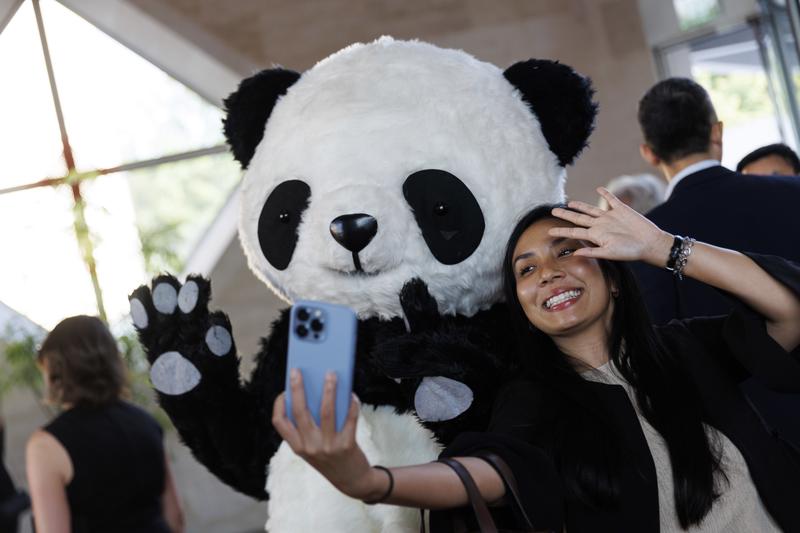 A visitor to "Pandaversary Night" at China's embassy in Washington, DC, poses for a selfie with the guest of honor on Wednesday. A documentary on a panda named Xiao Qi Ji was screened during the event held in celebration of 50 years of China-US relations. (PHOTO / XINHUA)
A visitor to "Pandaversary Night" at China's embassy in Washington, DC, poses for a selfie with the guest of honor on Wednesday. A documentary on a panda named Xiao Qi Ji was screened during the event held in celebration of 50 years of China-US relations. (PHOTO / XINHUA)
A "Pandaversary Night" party was thrown on Wednesday at the Chinese embassy to the United States to mark the 50th anniversary of giant panda's arriving in the US capital, and the Smithsonian's National Zoo expects the "pandamonium" to extend for several more years.
"Giant pandas are worthy ambassadors. They have much longer tenures than each of the Chinese ambassadors here, and they have much more fans than us," Chinese Ambassador to the United States Qin Gang said at the reception, to applause from an audience of about 300 guests from both nations.
The guests watched The Miracle Cub, a documentary that celebrates not only the second birthday of Xiao Qi Ji, or Little Miracle, the Smithsonian National Zoo's newest giant panda cub, but also five decades of China-US cooperation in giant panda protection and conservation.
The first pair, Ling Ling and Hsing Hsing, debuted at the Zoo on April 20, 1972, weeks after then-US president Richard Nixon's historic visit to China.
"Year by year, giant pandas have become an icon of mutual appreciation and friendship between the two peoples. In particular, the arrival of Xiao Qi Ji two years ago has brought us a happy surprise," Qin said.
He was referring to the cub's birth in the middle of the COVID-19 pandemic, coinciding with the deterioration of China-US bilateral relations to its lowest point in four decades.
The ambassador noted that the number of giant pandas in the wild in China has increased from several hundred 50 years ago to more than 1,800, which meant the species is no longer "endangered", thanks to unremitting efforts at protection and conservation.
"But sadly, 'panda-huggers' are endangered. Now they need protection and conservation," he said, in an apparent reference to China-US relations, with hawkish US politicians increasingly seeking to "outcompete" China by seeing the country as a challenger or even a threat to the US.
Qin mentioned that in addition to Xiao Qi Ji, a panda born in the US, Kung Fu Panda, one of his favorite movies, was also made in the US.
"I still remember a line from it: Yesterday is history, tomorrow is a mystery, but today is a gift, that is why it's called present!" he declared. "At present, we get together to cherish the wonderful gift of the panda. We need more pandas, and we also need more 'panda-huggers'."
Over the past 50 years, giant pandas have bonded US and Chinese scientists and animal care experts together to work on a shared goal: saving the species from extinction.
Pat Nixon, the former first lady of the United States, predicted "pandamonium is going to break out right here at the Zoo" in April 1972, when the Smithsonian's National Zoo and Conservation Biology Institute received the gifts from China.
In February that year, while visiting China with President Richard Nixon, the first lady was captured admiring a panda at the Beijing Zoo on a cold winter day.
Seated next to Chinese Premier Zhou Enlai at a dinner, she talked about her trip to the zoo and mentioned her fondness for the pandas, according to a video posted by the White House Historical Association.
Pat Nixon "screamed with joy" when she heard from Zhou that China would send two pandas to the US, according to the book Mao and Nixon: The Week that Changed the World, by Margaret MacMillan.
The first pair of giant pandas produced five cubs in the first 20 years, but none survived more than a few days.
Xiao Qi Ji, now the superstar at the Smithsonian Zoo, is the fourth surviving cub born at the zoo over the past five decades.
The arrival of Mei Xiang and Tian Tian in 2000 ushered in a new era of giant panda breeding at the Zoo. Since 2005, Mei Xiang has given birth to four surviving cubs: Tai Shan, Bao Bao, Bei Bei, and Xiao Qi Ji.
Three of the cubs have left for China to join the larger giant panda breeding program. Only Xiao Qi Ji lives with his parents at the Zoo.
Under an extension agreement, signed between the Zoo and the China Wildlife and Conservation Association, the giant panda pair, Mei Xiang and Tian Tian, and their son Xiao Qi Ji, will stay at the Zoo through December next year.
"We do know that at the end of that agreement that our pandas are expected to go back to China," Brandie Smith, director of the National Zoo, told China Daily at Wednesday's reception.
"We have had such an incredibly successful partnership, I'm absolutely committed to 50 more years of giant panda care and success and celebration for all of our visitors, so I look forward to working with our colleagues in China, as we are determined about the future for our giant panda program," she said.


